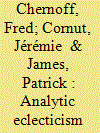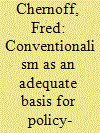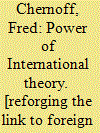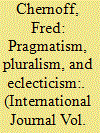|
|
|
Sort Order |
|
|
|
Items / Page
|
|
|
|
|
|
|
| Srl | Item |
| 1 |
ID:
175154


|
|
|
|
|
| Summary/Abstract |
Some scholars in International Relations and comparative politics continue to debate how to obtain the strongest explanatory theory whereas others hold that each approach should be treated as its own area of research. Both of these groups tend to agree that factors from across paradigms cannot be coherently combined with each other. On the contrary, Sil and Katzenstein have argued for analytic eclecticism in scholarship, which would not treat research traditions or paradigms as strict limitations on theory construction. Inspired by pragmatism, they have made a compelling case that considerations of usefulness and knowledge cumulation are more important than paradigmatic fidelity. This forum examines analytic eclecticism from the points of view of neo-empiricism, feminism, and interpretive constructivism, followed by a reply by Sil. A decade has passed since the publication of Sil and Katzenstein’s Beyond Paradigms, so it seems appropriate to reflect upon the strengths and weaknesses of analytic eclecticism.
|
|
|
|
|
|
|
|
|
|
|
|
|
|
|
|
| 2 |
ID:
087495


|
|
|
|
|
| Publication |
2009.
|
| Summary/Abstract |
This article considers three factual observations about the history of the study of International Relations and examines how well several different metatheories of IR can account for them. The three facts are, first, that there has been persisting disagreement between supporters of contending theoretical approaches; second, that there have been occasional cases in which opposing scholars have converged on certain conclusions; and third, that the field of IR was intended by its founders to have some bearing on policy and some capacity to help change the world. The article contrasts several well-known philosophical principles on which metatheories have been based. The article concludes that all three challenges can be met by only one such metatheory, which I term `causal conventionalism', based in part on principles developed a century ago by Pierre Duhem.
|
|
|
|
|
|
|
|
|
|
|
|
|
|
|
|
| 3 |
ID:
088098


|
|
|
|
|
| Publication |
2009.
|
| Summary/Abstract |
This article argues that scientific and critical realism have embraced several mistaken claims, among them that social science enquiry cannot proceed unless the theoretical objects of study are specified in advance. The article argues, rather, that although pre-scientific, observable objects and events must be specified from the outset, theoretical objects come to our attention only in the course of formulating theories. The article advances an alternative to scientific realist and critical realist foundations, namely, causal conventionalism, which is an adaptation to the social sciences of several elements of Pierre Duhem's conventionalist account of physical science. The article argues that major goals of theorising that scientific realism and critical realism seek to fulfill are better satisfied by the conventionalist alternative. In an effort to clarify some important issues, the article identifies and responds to a series of related criticisms of my views offered by Colin Wight in his recent article 'A Manifesto for Scientific Realism in IR: Assuming the Can-Opener Won't Work!' in 'Millennium', and in his book, Agents, Structures and International Relations: Politics as Ontology.
|
|
|
|
|
|
|
|
|
|
|
|
|
|
|
|
| 4 |
ID:
060008


|
|
|
|
|
| Publication |
Abingdon, Routledge, 2005.
|
| Description |
xiii, 253p.
|
| Series |
New international relations
|
| Standard Number |
0415701384
|
|
|
|
|
|
|
|
|
|
|
|
Copies: C:1/I:0,R:0,Q:0
Circulation
| Accession# | Call# | Current Location | Status | Policy | Location |
| 049353 | 327.101/CHE 049353 | Main | On Shelf | General | |
|
|
|
|
| 5 |
ID:
175155


|
|
|
|
|
| Summary/Abstract |
This paper seeks to show ways in which analytic eclecticism can be strengthened to encourage hybrid theorizing capable of yielding more practically useful principles for foreign policy decision-makers. The paper also seeks to show that some of the advantages of analytic eclecticism are overstated, notably the ability to sidestep difficult questions in the philosophy of social science. Nevertheless, with a proper deepening of their discussion of pragmatism, the core of the practical consequences of analytic eclecticism can be advanced with greater force and with a strengthened methodological rationale.
|
|
|
|
|
|
|
|
|
|
|
|
|
|
|
|
| 6 |
ID:
119993


|
|
|
|
|
| Publication |
2013.
|
| Summary/Abstract |
The article looks at one of the central arguments of Patrick Jackson's book The Conduct of Enquiry in International Relations: the attempt to advance methodological pluralism and dialogue among contending metatheoretical schools of International Relations. The article supports the goal of pluralism but argues that there is a significant gap in Jackson's support of it and that his version of pluralism inhibits metatheoretical engagement of different schools of thought. The latter in turn limits the possibility of progress in the field. The article outlines the missing steps in Jackson's argument, the way in which he unduly limits the contribution that the philosophy of science can make to scientific progress and an alternative argument for pluralism that leaves a role for genuine philosophical engagement and the possibility of progress in IR.
|
|
|
|
|
|
|
|
|
|
|
|
|
|
|
|
| 7 |
ID:
052892


|
|
|
|
|
|
|
|